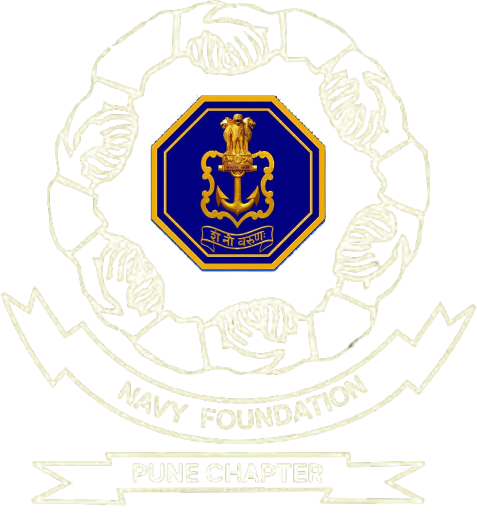
Pension Entitlements
Pensionary Benefits for Officers
Officers who complete 20 years minimum qualifying service are entitled to Retiring/Service Pension. The various pensionary benefits admissible to officers at the time of retirement/release are as under:-
- On Completion of Minimum Qualifying Service for Pension
- Retiring Pension/Service Pension.
- Retirement Gratuity/Service Gratuity.
- Commutation of Pension.
- Leave Encashment.
- Retiring before Completion of Minimum Qualifying Service for Pension i.e. Non-Pensioner
- Service/Retiring Gratuity.
- Retirement Gratuity provided service rendered is five/ ten years and above.
- Leave Encashment.
- Those Invalided from Naval Service due to Medical unfitness before rendering Minimum Qualifying Service for Pension
- Invalid Pension (with conditions).
- Disability Pension (with conditions).
- Invalid Gratuity (with conditions).
- Retiring Gratuity/Service Gratuity (If minimum service rendered is 10 years and above).
- Leave Encashment
(Authority:- MoD letters No. 1(6)/98-D(Pension/Services) dated 03 Feb 1998 and 17(02)/2016-D(Pen/Pol) dated 04 Sep 2017).
Retiring Pension
The Retiring Pension of officers shall be calculated at 50% of the Reckonable Emoluments last drawn. This includes Level of Pay in the Pay Matrix, Military Service Pay, and Non-Practising Allowance if any last drawn.
Additional Pension for Old Age Pensioners
In addition to pensionary benefits and Family Pension, old age pensioners/ family pensioners are also entitled to additional pension/ family pension from the age of 85 years onwards.
Commutation
Officers can commute a lump sum payment maximum upto 50% of their Retiring/Service Pension. The balance pension is treated as Residual Pension. Those who have commuted a portion of their Pension, are eligible for restoration of the commuted portion of pension on completion of 15 years. (Authority:- MoD letter No. 17(4)/2008(2)/D(Pen/Pol) dated 12 Nov 2008 and Commutation Regulations).
ePPO
All pensioners are being issued ePPO by CDA (Navy) with effect from 2016; with the PPOs issued to pre 2016 retirees also being converted to ePPO in a phased manner. An Aide Memoire by NAVPEN on ePPO and the procedure to download the same may be viewed here. Some issues highlighted by PCDA (Navy) regarding this conversion process is that the name of the spouse in the original PPO is either not the full name or there is a mismatch in the name; and that the date of birth is also sometimes not in the format dd/mm/yyyy. CDA (Navy) has sought the correct details from affected pensioners, which is being coordinated by respective Navy Foundations. Documents required for correction/updating of date of birth of spouse can be seen here.
To download the e-PPO, regular retirees are required to click here and pre-2016 retirees to click here. If all the particulars are correct, take a printout and keep it safely; If there is any mistake like Spouse Name, DOB or Bank particulars, please send an email to LOIC NavPen at [email protected] with cc to PCDA(Navy) at [email protected]. Do attach required documents like School Leaving Certificate and Aadhar card for change of DOB, Bank pass book and a blank cheque for change of Bank particulars. Queries can be clarified during working hours from LCdr Abhimanu Shekhawat of NavPen on 9145533059 / 7219610761.
DigiLocker Facility for ePPO
An initiative has been taken by the PCDA (Navy) for veterans to upload and store their ePPO on the DigiLocker app/website so they can access it at any place and time. The procedure for uploading the ePPO on DigiLocker may be seen here.
Project SPARSH
The System for Pension Administration (Raksha) (SPARSH) is an initiative of the Ministry of Defence that aims to give a Defence Pensioner a completely transparent view of his / her pension account through a platform that will capture and maintain a complete history of events and entitlements the pensioner right from the date of commencement of pension to the date of cessation of pension due to his/her last eligible beneficiary. This system will be administered by the Defence Accounts Department through the Principal Controller of Defence Accounts (Pensions), Prayagraj and shall cater to all three Services and allied organisations. The system initially migrated all new retirees on rollout and has subsequently been extended to cover the existing defence pensioners. The system caters to all activities of the pension cycle namely: Initiation and Sanction, Disbursement, Revision and Service and Grievance Request Management.
The SPARSH Portal
The SPARSH portal provides a Defence Pensioner access to and control of his pension account. A person whose pension is due is onboarded on the portal at the time of processing his / her pension claim. The Pensioner is allotted a unique account number once his / her digitised audited pension claim is ready for forwarding to PCDA(Pensions) for the issue of the Pension Payment Order. The Pensioner is informed of this account number on the mobile number/email address furnished by him/her at the time of furnishing his / her pension claim which he/she can use to onboard on this portal. Once the Service Record Holder and the corresponding Pay Accounts Office prepares the pension claim it is made available to the pensioner on the portal for verification. This process is called Pensioner Data Verification (PDV). PDV ensures that the pensioner has the final say with respect to the information furnished to the Pension Sanction Authority. The Portal also enables the pensioner to furnish the requisite declarations/ nominations/requests for commutation. The portal also provides the option to the pensioner to use enabled services for quicker processing of his requests and signing of declarations making his experience a truly paperless and hassle-free one.
- FAQs on SPARSH
- Aide Memoire on SPARSH by NAVPEN
- Procedure for migration to SPARSH by NAVPEN
- SPARSH Instructions for NRIs
- Annual Life Certification through SPARSH
NGIF Benefits
Retiring / discharged naval personnel are also entitled to Naval Group Insurance Fund (NGIF) survival benefits, in addition to the above pensionary benefits. Single non-refundable term premium at the rate of Rs. 62,100/- will, however, be retained out of the survival benefit of NGIS payable on retirement, for PRDIES Scheme (see below).
Post Retirement Death Insurance Extension Scheme (PRDIES)
The ‘Post Retirement Death Insurance Extension Scheme 1982’ (PRDIES) scheme, providing extended insurance cover for death after retirement from service, was introduced w.e.f 01 Jan 82. The scheme will be compulsory for all retiring Naval members of the existing Naval Group Insurance Scheme, including those re-employed after retirement. One-time non-refundable term premium at the rate of Rs. 62,100 is deducted from the survival benefit of NGIS payable at the time of retirement, to provide a term insurance cover of Rs 10 lacs. No payment or refund of any kind is admissible out of this premium for PRDIES to the individuals who exit the scheme by survival beyond the period of Extended Insurance Cover. The PRDIES Insurance Certificates and related documents in case of officers are issued by NGIS section of DNPF/Integrated HS, MOD (Navy) at the time of their retirement/release from service on receipt of completed application forms for PRDIES.
Veterans are to ensure that they make out a valid nomination in the application form for PRDIES. If a veteran is to, unfortunately, die within the period of insurance cover, the nominees/beneficiaries are to submit an insurance claim and relevant documents, whereupon Insurance Benefits will be paid in a lump sum to them. In the absence of a valid nomination, the insurance benefits will be paid in accordance with the Will / personal law of the deceased member.
Gratuity
Service personnel who have completed five years of total Qualifying Service and are eligible for Service/Retiring/ Disability/Invalid Gratuity and Pension shall be eligible for Retirement Gratuity. The Retirement Gratuity is payable at ¼ of the Reckonable Emoluments for each six monthly period of qualifying service subject to a maximum of Rupees Twenty Lakhs only. The minimum period of qualifying service is ten years for earning Retiring/ Service Gratuity in the case of Permanent Commissioned Officers. SSC Officers are entitled to Terminal Gratuity at the rates of ½ a month’s Reckonable emoluments i.e. as applicable to Retiring Gratuity. An individual invalided out of service with a disability, neither attributable to nor aggravated by service, will be entitled to Invalid Gratuity, if he / she has actually rendered less than 10 years of service. (Authority:- MoD letter No. 1(6)/98-D(Pension/Services) dated 03 Feb 1998).
Of the total Retirement Gratuity, NAVPEN will deduct Rs. 1,20,000 as one time subscription amount for ECHS Membership.
Pensionary Benefits – Family Pension
Ordinary Family Pension
In case of death of an Armed Forces personnel after retirement with a Service/ Retiring/ Disability/ Invalid/ Special Pension, Ordinary Family Pension shall be admissible to the widow/ NoK. The ordinary family pension shall be calculated at 30% of Last drawn Reckonable Emoluments subject to a minimum of Rs. 9000/- p.m. and a maximum of 30% of the highest pay.
Consequent to the implementation of the SPARSH system, on the death of a pensioner, the spouse has to first report the death to SPARSH and thereafter apply for family pension. The procedures along with videos explaining the same may be viewed by clicking on the relevant button below. A clarification on both these functions, issued by PCDA (P) may be accessed here. While it is assumed that the majority of pensioners would migrate to SPARSH, there may be some who prefer to continue with the legacy system of getting the pension through Pension Disbursing Banks, for which this letter is required to intimate the banks about the demise of the pensioner and commencement of the family pension. It has however been observed that often on the death of a pensioner, the spouse/family members of the deceased pensioner are asked by the Pension Disbursing Banks to submit details and documents, which are otherwise not required for commencement of family pension. This amounts to harassment of the spouse and family members and often leads to avoidable delay in commencement of family pension by the Banks. Accordingly, the Dept of Pensions and Pensioners Welfare, Govt. of India has issued a letter to the CMDs/CPPCs of banks reiterating the documents required and requesting them to refrain from seeking unnecessary documentation.
Eligible Members of Family for Ordinary Family Pension
The following are considered as eligible members of a deceased veteran’s family entitled to ordinary family pension:-
- Wife lawfully married before or after retirement
- A judicially separated wife
- Son below the age of 25 years and unmarried daughter (including those illegitimate and adopted legally before or after retirement) or till the date of earning livelihood whichever is earlier.
- Widowed/ divorced daughter up to the date of re-marriage and until the earning is not more than Rs. 3500/- + DR p.m. whichever is earlier.
- Parents wholly dependent when the officer has not left behind a widow/ widower, eligible son or daughter or a widowed/ divorced daughter and the earning of the parent is not more than Rs. 3500/- + DR p.m. The beneficiary is required to furnish an income certificate by themselves. The family pension to parents will be admissible with effect from 1.1.1998 but will cover cases where the death occurred even prior to 1.1.1998). In the case of parents, the mother will receive the pension first.
Other Eligible Family Members
In addition to above, the following members are also eligible for ordinary family pension:-
- Handicapped children- son or daughter suffering from any disorder of disability of mind or physically crippled or disabled so as to render him unable to earn a living even after attaining the age of 25 years.
- Post retiral spouses.
- Children born out of void or voidable marriage.
- Children born from divorced wife where conception took place before divorce.
Family Categories
For the purpose of grant of family pension, the Family has been categorized into two categories as follows:-
- Category I
- Widow or widower, up to the date of death or re-marriage whichever is earlier.
- Son / daughter (including widowed daughter), up to the date of his / her marriage / re-marriage or till the date she starts earining or up to the date of death, whichever is earlier.
- Category II
- Unmarried / widowed / Divorced daughter not covered by Category I above up to the date of marriage / re-marriage or till the date she starts earining or up to the death of death, whichever is earlier.
- Parents who were wholly dependent on the Armed Forces personnel when he / she was alive provided the deceased personnel had left behing neither a widow nor a child.
Enhanced Family Pension
Where a veteran officer dies after retirement with pension, having rendered not less than 7 years as a pensioner, the enhanced rate of family pension is admissible for 7 years from the date of his death or up to the date he would have attained the age of 67 years, whichever is earlier. The amount of enhanced rate whall be the lowest of the following amounts:-
- 50% of the reckonable emoluments
- Amount of retiring/ invalid/ service element of disability pension.
The maximum amount of enhanced rate of Family Pension shall be 50% of the highest pay in the Govt.
(Authority-: MoD letters No 17 (4)/2008/D(Pen/Pol) dated 12 Nov 08, No.16(6)2008 (2) /D(Pension/Policy) dated 05 May 09 and No. 17(4)/2008(2)/D(Pen/Policy) dated 05 Jun 09, 17(02)/2016-D(Pen/Pol) dated 04 Sep 2017)



